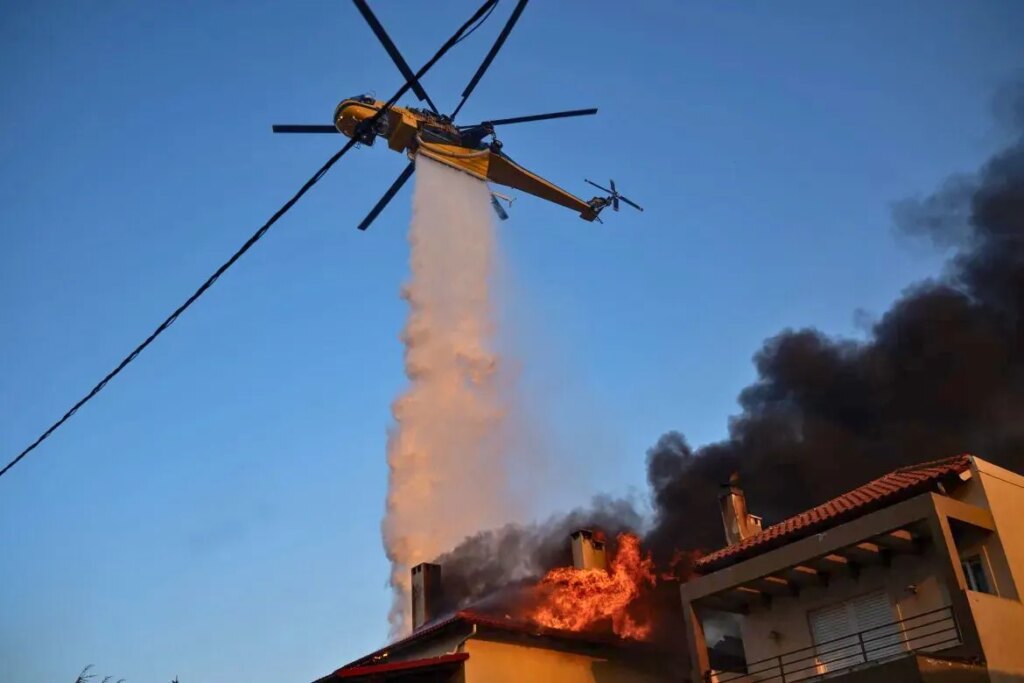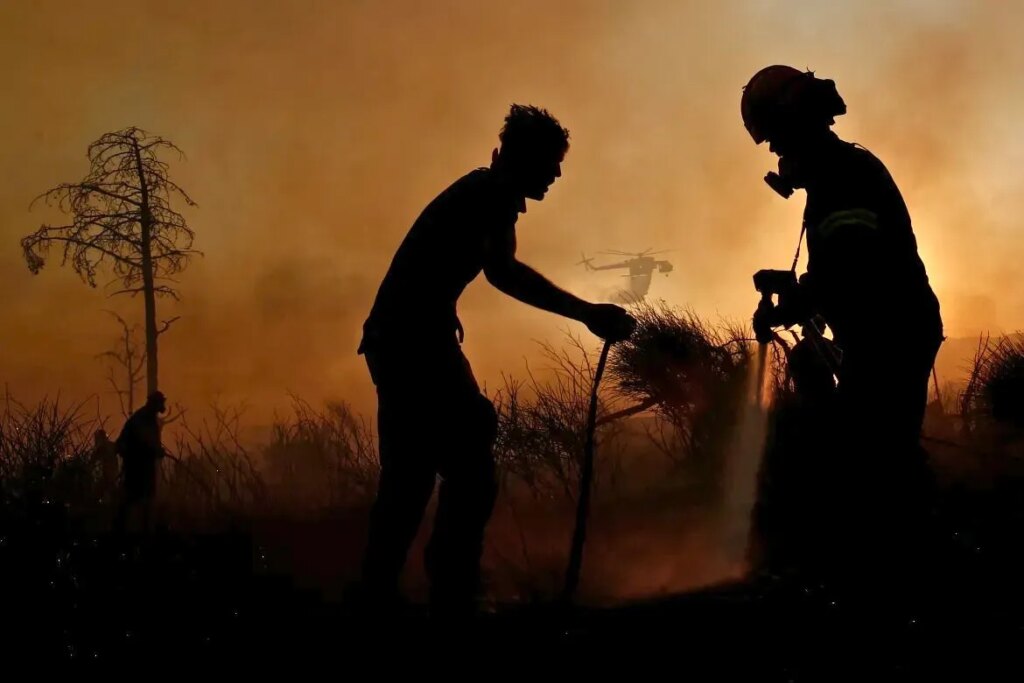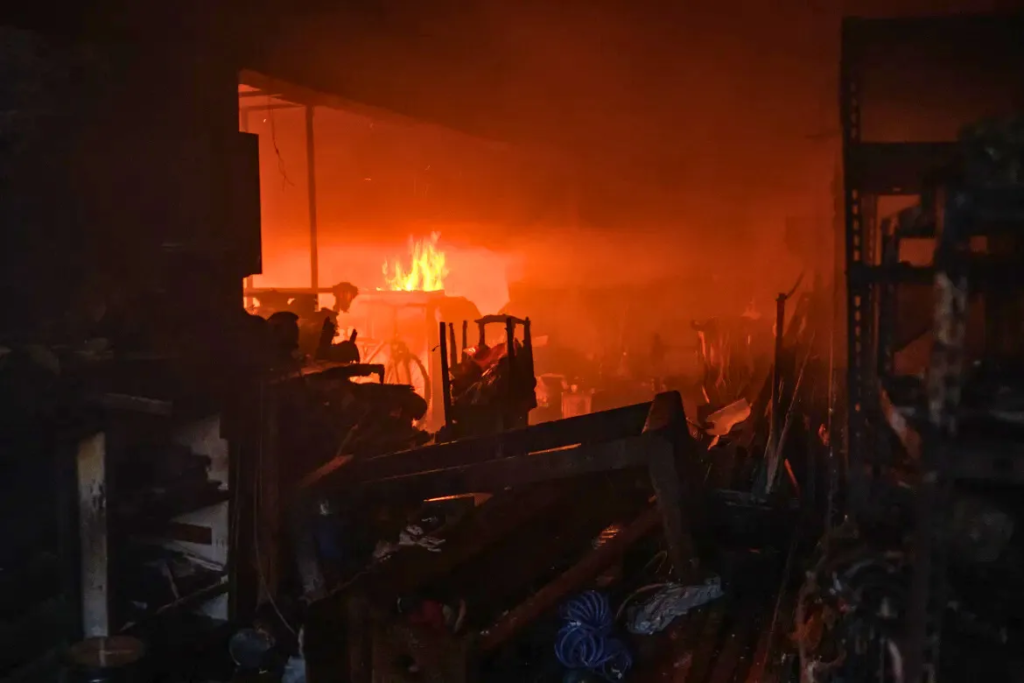Greece Fights Deadly Wildfires as Thousands Flee Athens
Summary 31 people taken to hospitals with breathing problems from smoke Greek firefighters battle fires across 156 square miles of…
Summary
- 31 people taken to hospitals with breathing problems from smoke
- Greek firefighters battle fires across 156 square miles of land
- Thousands of residents evacuated from Athens suburbs
- 700 firefighters deployed with 190 fire trucks and 33 aircraft
- European Union sends emergency aid including helicopters and planes
Raging flames turn Attica into a firestorm zone
The wildfires erupted near the suburbs of Attica especially in areas such as Keratea Lavrio and Nea Makri as extreme heat and strong winds intensified the crisis turning entire neighborhoods into fire traps and prompting mass evacuations
Emergency sirens echoed as helicopters roared overhead dropping water while exhausted firefighters fought to keep the infernos from engulfing homes roads and vital infrastructure
Families flee as homes burn and skies turn orange

Residents in towns surrounding Athens were seen fleeing with pets suitcases and whatever belongings they could grab in minutes while thick smoke clouded visibility and fireballs leapt from tree to tree across dry pine forests
One local from Lavrio told Greek television that their entire neighborhood was surrounded by fire with children and elderly barely escaping in time
Related Conflict Coverage
Conflict-driven displacement can be found in this report on Thailand Cambodia border clashes
EU civil protection mechanism springs into action
In response to Greece’s urgent request on August twelve twenty twenty four under the EU Civil Protection Mechanism multiple European countries rushed to assist in battling the wildfires
European Aid Deployments
France deployed over one hundred eighty firefighters and fifty five fire trucks along with a Eurocopter helicopter to help suppress the flames
Italy dispatched two Canadair CL four fifteen aircraft specialized in dropping water on fast spreading fires
Romania and Czechia also sent dozens of firefighters and support vehicles to stand with Greek teams in a show of European solidarity
Heroic efforts continue but dangers persist

Despite combined firefighting teams and air support containment remains elusive as winds keep shifting and fresh blazes ignite near already affected areas
Greek authorities remain on high alert as new evacuation orders are issued daily while medical teams provide oxygen and care for those suffering from respiratory issues
Related Global Action
Read how France took a stand on a global issue amidst crisis here
How bad the fires really were

The wildfire burned 40 square miles of land near Athens. Thirty-one people had to go to hospitals because they had trouble breathing from all the smoke.
The fire spread very fast, burning 156 square miles total. Hospitals had to move their patients to safety, including sick children. Greece sent 700 firefighters to help, plus volunteers, 190 fire trucks, and 33 planes that drop water on fires.
People had to leave their homes quickly as the fire got closer. Families could only watch as the flames burned down their houses. When people came back later, many found their homes were gone. Whole neighborhoods were covered in ash where wedding halls and family shops used to be.
Climate change makes fires worse
Scientists say that hotter weather and long dry periods caused by climate change have made the Mediterranean area a place where wildfires happen a lot. Each year the fires get more dangerous.
Local groups that care about the environment say that cutting down trees and not taking care of rural lands makes fires spread faster. They warn that countries around the world need to act now to stop climate change.
What satellites show us
Pictures from space taken by NASA’s fire tracking system and European satellites show more and more burned areas across Greece in 2025. This makes it one of the worst fire years in over ten years.
The NASA satellite information shows that bad gases from forest fires went up by 60% around the world between 2001 and 2023. This proves that climate change is making wildfires happen more often and burn hotter.
How space helps fight fires
Special cameras in space now watch for fires all the time. NASA’s fire tracking system helps firefighters on the ground know where fires are and how fast they’re moving. These space cameras can spot heat and smoke to help people get away safely.
Forest fires create about 25-35% of the bad gases that make our planet warmer. This means fires both happen because of climate change and make climate change worse. Scientists study the fires in Greece to learn how fires might happen in other parts of Europe.
Countries now work together to share information about fires. The European Space Agency watches for fires 24 hours a day in places where fires happen a lot. This helps firefighters get there faster and know how dangerous the fires might be.
Disasters echo far beyond borders
The chaos gripping Greece draws parallels to turmoil elsewhere showing how disasters whether natural or political displace thousands disrupt lives and reshape societies
Parallel Conflicts
The impact of international conflict on stability is examined in this Southeast Asian border conflict report here
Stories of courage emerge from the ashes

In a moving account a Greek astronomer whose observatory faced flames was aided by neighbors who formed a human chain to protect the equipment and animals they cared for
Uplifting Human Stories
This tale of unity mirrors sentiments expressed during a surprising corporate revelation covered here
Looking ahead rebuilding and resilience

As fires gradually subside attention turns to rebuilding scorched towns supporting displaced families and preventing future disasters
Greek Government Action
The Greek government has announced money to help people rebuild and plans to plant new trees. They also want all EU countries to work together better to fight climate change and be ready for disasters.
People are now building back with help from groups around the world, using what they learned from other big fires. News reports show how towns are already starting to rebuild. They’re making new rules about how to build houses that won’t burn as easily and better plans for getting people out safely when fires happen.






